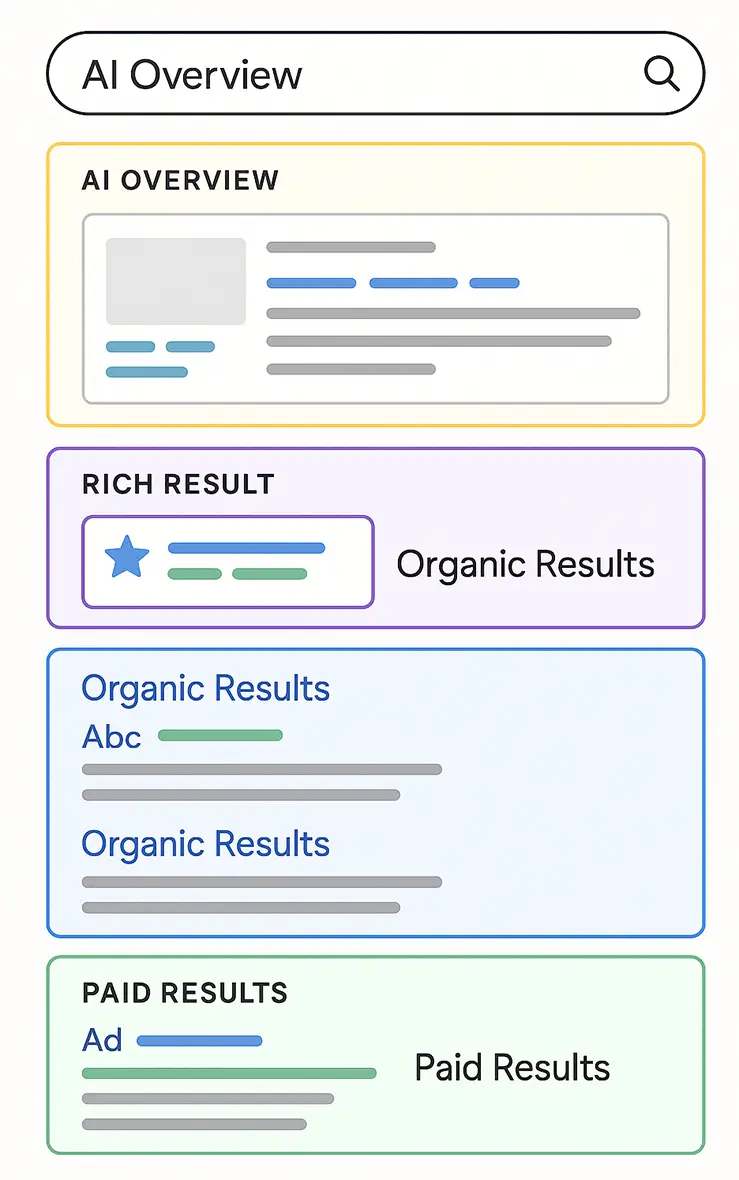| Lesson 4 | Interpreting Search Results |
| Objective | Identify information on a search results page. |
Interpreting Search Engine Results
To identify information on a Search Engine Results Page (SERP), like what you see on Google, Bing, or DuckDuckGo, look for the following key components. These can help you understand how content is being ranked, presented, and optimized:
- Search Query
- The phrase or keywords you typed into the search bar.
- Often appears at the top of the SERP.
- Organic Results
- Title Tag (Blue Link):
- The clickable headline (usually from the
<title>HTML tag). - Should be descriptive and relevant to the search query.
- The clickable headline (usually from the
- Meta Description (Gray Text Below Title):
- A brief summary pulled from the page’s
<meta name="description">. - May be rewritten by the search engine to better match the query.
- A brief summary pulled from the page’s
- URL (Green or Black Text):
- Shows the web address (domain + slug).
- Sometimes breadcrumb-style to show site structure.
- Title Tag (Blue Link):
- Rich Snippets / Structured Data
- Enhanced listings with extra information like:
- ★ Review stars
- 📅 Event dates
- 📦 Product availability
- 🧾 FAQs (expandable answers)
- Enabled by Schema.org markup (
JSON-LDorMicrodata).
- Enhanced listings with extra information like:
- Paid Ads (Sponsored Results)
- Usually labeled with “Ad,” “Sponsored,” or similar.
- Appear at the top or bottom of the SERP.
- May include sitelinks, prices, or calls to action.
- SERP Features (Universal Search Results)
- These vary based on the query and can include:
- Featured Snippet: Boxed answer at the top.
- People Also Ask: Expandable questions.
- Knowledge Panel: Right-side box with facts (for entities like people, businesses).
- Local Pack: Map and business listings (for local intent).
- Image Pack: Thumbnails for image searches.
- Video Results: Thumbnails linked to YouTube or other video platforms.
- Top Stories: News cards with timestamps.
- These vary based on the query and can include:
- Query Refinements and Filters
- Suggestions like:
- "Did you mean…"
- Spelling corrections
- Tabs (e.g., All, Images, News, Shopping, Videos)
- Suggestions like:
- Tools for Evaluation
- You can inspect and evaluate the page elements using:
- Google Search Console (for your own site)
- SEO tools like Ahrefs, SEMrush, Moz, or Screaming Frog
- Browser DevTools (Right-click → Inspect)
- You can inspect and evaluate the page elements using:

🧠 What Are AI Overviews?
AI Overviews, formerly known as SGE (Search Generative Experience), have become a significant component of modern Search Engine Results Pages (SERPs), especially on Google. Here's a breakdown of how they work and where they fit within the search experience:
AI Overviews are AI-generated summaries that appear at the top of a SERP in response to a user's query. They're generated in real time by large language models (LLMs) like Google's Gemini and are designed to provide a comprehensive answer or snapshot of the topic without requiring a user to click through to other websites.
📌 Key Characteristics of AI Overviews:
- Position on the SERP
- Displayed above or alongside traditional organic search results.
- Often the first visible content, pushing down standard blue-link listings.
- Content Structure
- Summarized paragraph(s) responding directly to the query.
- May include citations (clickable links) from multiple sources.
- Includes product recommendations, steps, pros/cons, timelines, or comparisons depending on query intent.
- Interactive Features
- Expandable follow-up questions (suggested next queries).
- Sometimes includes carousel elements, visual cards, or links to deep sources.
- Google might tailor these answers based on user search history or context.
- “How to fix a leaky faucet”
- “Best travel destinations for families”
- “What is quantum computing?”
- “Compare iPhone 15 vs Galaxy S24”
- Opportunities:
- Featured as a source: Sites with well-structured, high-authority content may be cited in the AI overview.
- Increased visibility if included in the AI snapshot—even above top-ranked organic listings.
- Risks:
- Fewer click-throughs: Users may get the answer directly from the overview, reducing traffic to the original sources.
- Greater competition for attention within a compressed screen space.
📐 Design and Technical Aspects:
- Powered by LLMs that synthesize data from trusted web sources.
- May favor pages with:
- Clear structure (e.g., headings, schema markup)
- Expertise and topical authority
- Fresh and accurate content
🔮 Future Direction Google has stated that AI Overviews will be rolled out to more users and countries in 2025, especially for complex queries. They're part of Google's broader push toward a “search assistant” model, moving from information retrieval to information synthesis.
Your position in the results has a huge impact on the traffic you will receive. Studies on the impact of SERP position have shown widely varying results, but do agree that the advantage of higher positions is significant.